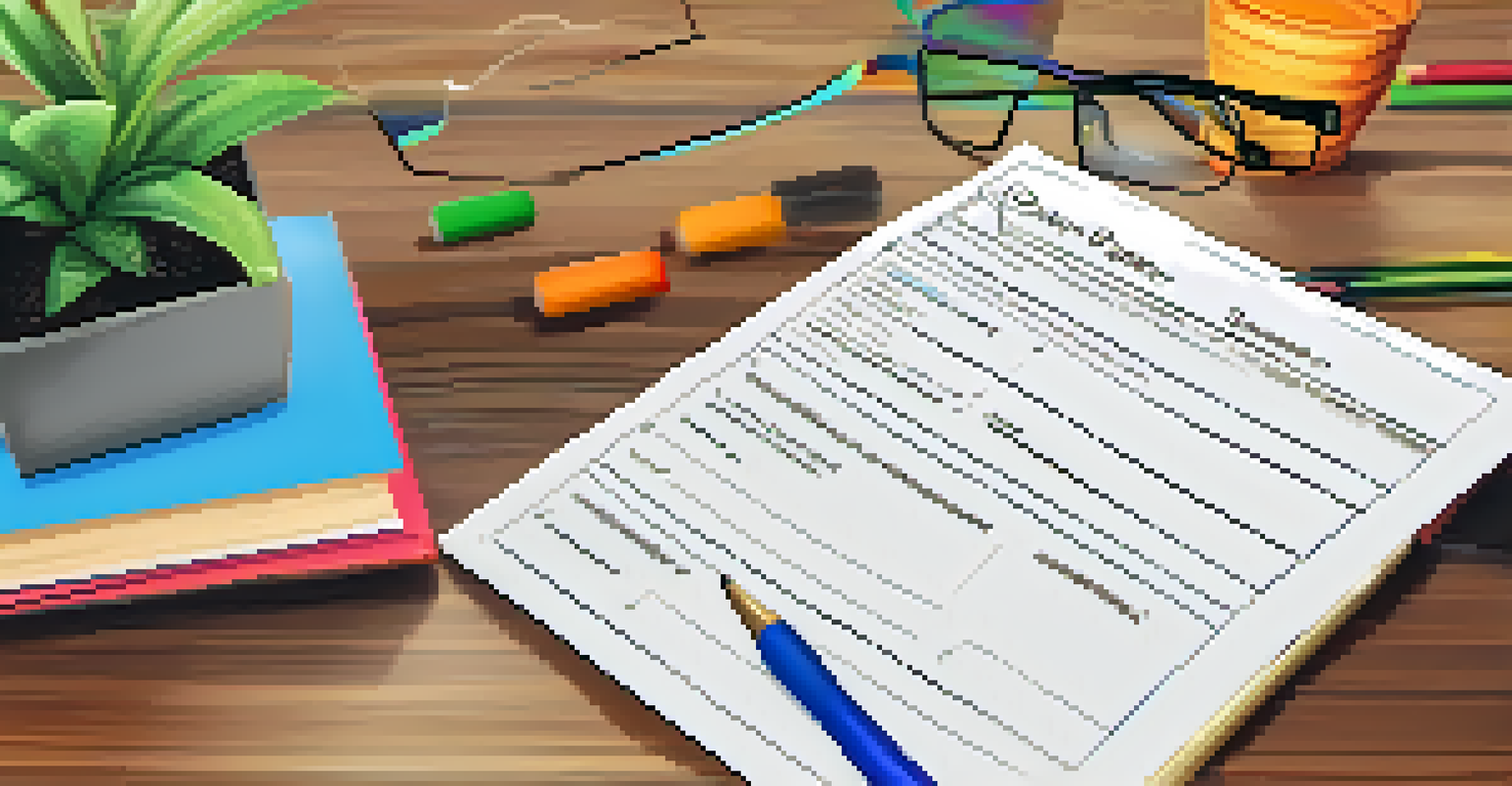Career Assessment Tools: A Guide for Students

Understanding Career Assessment Tools for Students
Career assessment tools are designed to help students identify their strengths, interests, and potential career paths. They can range from simple questionnaires to comprehensive evaluations that analyze personality traits and skill sets. By using these tools, students can gain valuable insights into fields that align with their aspirations and capabilities.
It's not the job you do, but how you do the job that makes a difference.
For instance, a student who enjoys problem-solving might be steered toward engineering or mathematics-related careers. Meanwhile, another student with a passion for helping others might find fulfillment in healthcare or social work. This initial exploration can be incredibly liberating, as it opens doors to new opportunities they may not have considered before.
Ultimately, these tools serve as a roadmap, guiding students toward choices that resonate with their personal values and future goals. They not only provide clarity but also help in building confidence as students embark on their career journeys.
Types of Career Assessment Tools Available
There are several types of career assessment tools available, each serving a unique purpose. Interest inventories, for example, help students discover what activities they enjoy and how those interests can translate into careers. Personality assessments, on the other hand, provide insights into how individuals interact with others and their work environment.

Some popular examples include the Myers-Briggs Type Indicator (MBTI) and the Holland Code (RIASEC). Both tools take different approaches—MBTI focuses on personality types, while RIASEC categorizes careers based on interests. Understanding these distinctions can help students choose the right assessment tool for their needs.
Career Assessments Guide Choices
Career assessment tools help students identify their strengths and interests, guiding them toward suitable career paths.
Moreover, skills assessments evaluate what students can do, measuring their competencies against various job requirements. By considering all these types, students can create a holistic view of their potential career paths, leading to more informed decisions.
How to Choose the Right Career Assessment Tool
Choosing the right career assessment tool can feel overwhelming, but it doesn't have to be. Start by reflecting on your goals: are you looking to explore various options, or do you want to narrow down a specific field? Understanding your priorities will help you select a tool that meets your needs effectively.
The greatest danger in times of turbulence is not the turbulence; it is to act with yesterday's logic.
It's also beneficial to seek recommendations from teachers, counselors, or career coaches who can provide insights based on their experiences. They often have firsthand knowledge of which tools have helped students in the past. Additionally, consider online reviews or testimonials from other users to gauge the effectiveness of a particular assessment.
Finally, don’t hesitate to combine multiple tools to get a well-rounded perspective. By using different assessments, you can cross-reference results and gain a deeper understanding of your unique strengths and preferences.
The Benefits of Using Career Assessment Tools
Career assessment tools offer numerous benefits, particularly for students navigating their future. One major advantage is the clarity they provide, helping individuals understand their skills and how they fit into the job market. This can significantly reduce anxiety around choosing a career path, making the decision-making process feel less daunting.
Additionally, these tools promote self-reflection and personal growth. As students engage with the assessments, they often uncover hidden talents or interests that they weren't previously aware of, igniting new passions. This newfound awareness can inspire them to pursue opportunities that align with their authentic selves.
Variety of Assessment Tools Available
Different types of career assessment tools, such as interest inventories and personality assessments, cater to unique needs and preferences.
Furthermore, using these tools can enhance academic performance. When students are aligned with their career goals, they are more likely to engage in their studies and perform better, knowing that their education is directly connected to their future aspirations.
Common Misconceptions About Career Assessment Tools
Despite their benefits, many students harbor misconceptions about career assessment tools. One common myth is that these assessments will dictate their career choices, leaving little room for personal agency. In reality, these tools are meant to provide guidance and insights, not to limit options.
Another misconception is that career assessments are only useful for undecided students. In truth, even those with a clear career path can benefit from reassessing their skills and interests, especially as they evolve over time. Career landscapes change, and so do individual aspirations, making these tools relevant at various stages.
Lastly, some students believe that these assessments are too complicated or time-consuming. While some assessments may require time and effort, many are quick and user-friendly. A little investment in these tools can yield significant benefits for future career satisfaction.
Integrating Career Assessments into School Programs
Schools play a crucial role in helping students access career assessment tools. Integrating these assessments into the curriculum can create a culture of career exploration, empowering students to take charge of their futures. For example, career days or workshops can provide opportunities for students to engage with various assessments.
Moreover, educators can incorporate discussions around career assessments into existing classes. By connecting subject matter to potential career outcomes, students can see the relevance of their studies in real-world contexts. This not only enhances learning but also motivates students to excel academically.
Next Steps After Assessments
After completing a career assessment, students should reflect on results, research aligned careers, and seek practical experiences.
Collaboration with local businesses and organizations can further enhance career assessment initiatives. By bringing in professionals to share their experiences and insights, students can gain a clearer understanding of various careers and the skills required to succeed in them.
Next Steps After Completing a Career Assessment
Once students complete a career assessment, the next steps are vital for translating results into action. Start by reviewing the findings and reflecting on how they align with personal values and long-term goals. This reflection can help students prioritize which career paths to explore further.
Following this, research potential careers that match the assessment results. Look into job descriptions, required qualifications, and industry trends to gain a comprehensive understanding of the paths available. Informational interviews with professionals in those fields can also provide invaluable insights and real-world perspectives.

Finally, encourage students to pursue internships or volunteer opportunities related to their interests. These experiences can offer hands-on learning and help solidify their career choices, making the transition from assessment to action smoother and more informed.